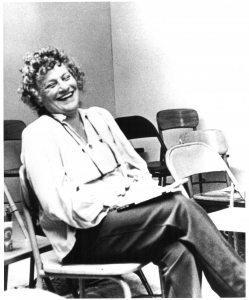Playwriting is not Scene Improvisation
Some students find it very difficult to keep from “writing a play.” They remain separate from the group and never interrelate. Their withdrawal blocks progress while working on-stage. They do not enter into relationships but manipulate their fellow students and the stage environment for their own purposes. This “playwriting” within the group violates the group agreement, prevents process with the other players, and keeps the user from achieving an expanding creative personal experience.
Scene improvisation can only evolve out of group agreement and playing. If playwriting continues, the players do not understand the focus. Sometimes a whole group, not understanding this point, will all be playwriting. – From Improvisation for the Theater by Viola Spolin
Playwriting was a bad habit of mine and I had trouble breaking that habit in the early days with Viola.
The urge to ‘come on with something’ is very powerful for an actor about to enter an improvisation. I believed if I come on and don’t have something ‘fun’ or ‘interesting’ or ‘dramatic’ I have no business being on stage. Or worse, the audience and the other players will hate me for not ‘giving them something’ they can work with.
Make an offer!
I thought to myself, “What can I add that will make the scene go better? How can I enter a scene or start a scene that will make me look like I know what I’m doing up there and the audience will think I’m really funny and, dare I say… brilliant, even.”
Every time I did ‘come on with something’ it rarely was brilliant and I had trouble going with the flow. My offer was usually accepted but then, without realizing it, I got lost because it didn’t go where I wanted it to. Instead without realizing, I had already thought two moves ahead: “If I say this, then they’ll say something like that… and then I can say A, B, or C.”
I was so used to thinking in that way. All my funny ideas was my ammunition against the prospect of going out there with nothing and not contributing.
How wrong I was. I knew it intellectually. I knew that it was better to jump up before an idea hit me and I was already in my head, but I couldn’t help it. I used to sit there and watch scene after scene and not go up, because just as I was ready to go up, an idea popped in my mind as to what to add. “Playwriting!” I said to myself. “Stop it!” and I’d literally slap my own face trying to erase that clever offer I wanted to bring on with me. In fact that first year, I slapped myself silly!
It got so bad I rarely entered any scenes and only started them. I could start a scene, because I wrote myself a good premise, character or action to start. I could easily let it flow from there, but I couldn’t enter a scene without a really good offer.
This was how I spent that first year in Viola’s class. How she allowed me to continue, I don’t know. She would bellow at me, “What are you DOING??!!!” “Can’t you see you’re in your head?” I didn’t mind her temper because I knew better, but I just couldn’t stop my compulsive brain.
“Yes.” I said. “I know.”
“Alright then.” She’d say.
There’s Always a Reason
She never once asked me why and I never offered an excuse. This was a blessing. It allowed my fear to diminish on its own. Because not demanding to know the reason allowed me to not feel more ashamed of my failure, which would have reinforced it. Instead, we both knew that reasons wouldn’t help anyway.
Bottom line, I was afraid.
The habit of being clever and funny was my defense against the world. I knew how to inject really good humor and was a good one at parties, etc. for being considered ‘the funny one’. It was this ability Viola was out to eradicate and I wanted desperately to stop making clever offers and just jump in. But I couldn’t.
What could I offer if I didn’t have humor? It would be a year or more before I found that out and stopped “Making offers”.
